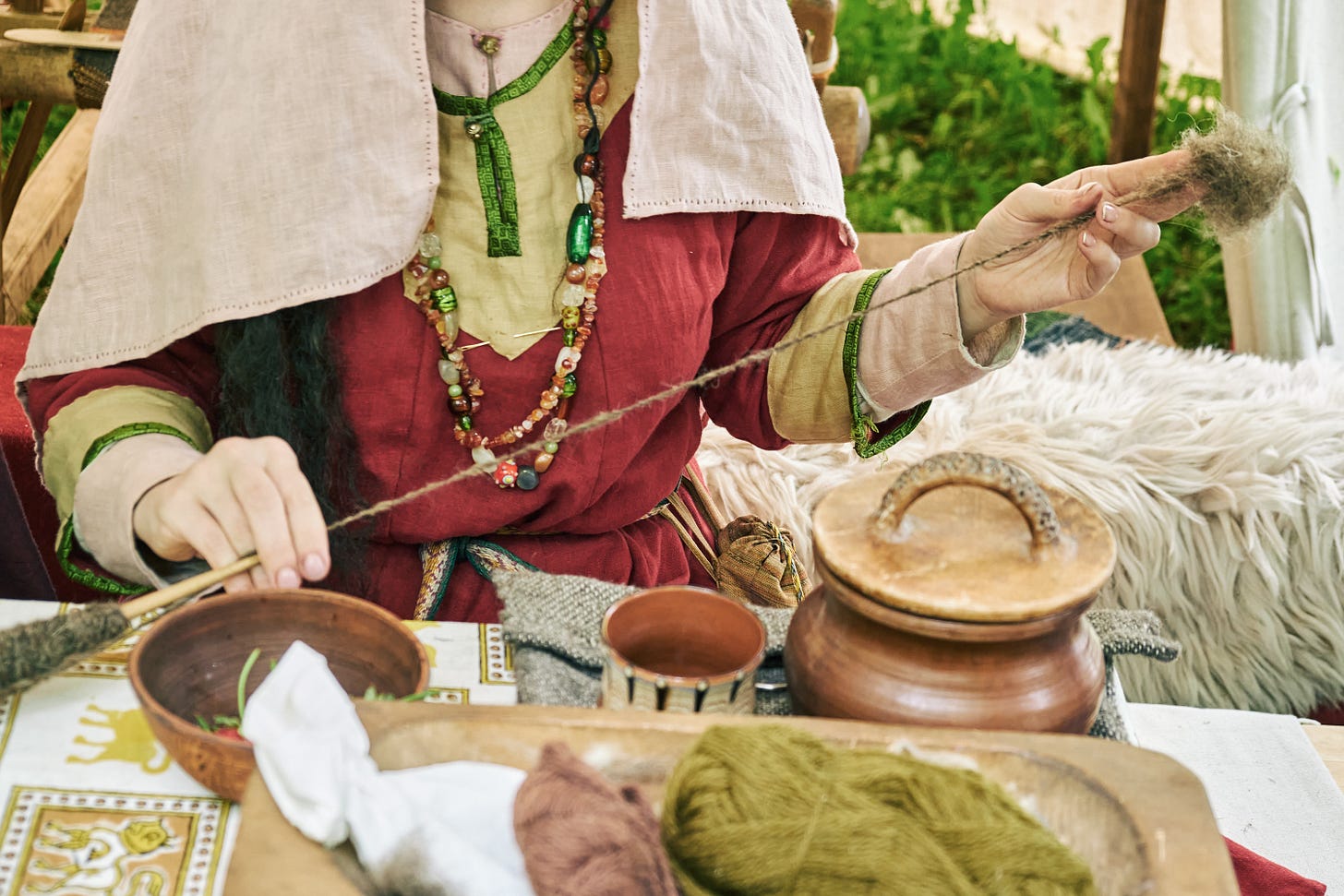I'm gonna say this right up front, because it needs saying.
Frigg and Freya are NOT the same goddess. I'm not debating this. There are enough differences between the two goddesses that they are distinct entities. Most of folks who are pushing this theory are men who think that because Odin fucked them both that must mean that Frigg and Freya must be interchangeable. And while I could spend a lot of effort unpacking why this is a messed up, misogynistic way of looking at things, I will move on to directly address Frigg herself. Because she deserves that.
The first thing that most people learn about Frigg is that she is the wife of Odin, the queen of Asgard. Frigg is the only other deity besides Odin with a right to ascend the Hlidskjalf, the throne atop Asgard that allows those seated upon it to see into all of the nine worlds. She is the daughter of an earth goddess, and is the mother to Thor. Her relationship with Odin will look familiar to many as the famous analogy from “My Big Fat Greek Wedding” — the man is the head, but the woman is the neck, and she can, if she wills it, turn the man in any direction she wishes. She famously convinces her husband Odin to grant victory to one side of the battle by convincing him that they will resolve their disagreement in the morning, when he will grant victory to the first group he sees upon awakening. She then engineers that her favored side is the one he sees by mobilizing the army’s women.
She is most noted for her role in the death of the god Baldr, who is one of her sons. Baldr begins having dreams that his life is in danger. Baldr is the most light filled and sweetest of the Aesir, and Frigg is horrified that her precious son might die. So she goes across all the nine worlds, and secures from every being, every rock, every plant, every animal, a promise not to harm Baldr. Only the lowly mistletoe plant has evaded Frigg’s entreaties. Loki then uses the plant to arrange for Baldr to be killed at the hand of his brother, Hodor. Frigg calls for one of the gods to go and plead with Hel in the underworld to bring Baldr back. Hel says she will release Baldr if all of creation will weep for him. Frigg again takes up the cause, and successfully gets nearly all of creation to sob and cry for Baldur, even the mistletoe. Only one being, Loki, having shape shifted into an old woman, refused, and so Baldr could never return.

Frigg is considered a goddess of home and hearth, but she is the most powerful of the Aesir goddesses. She “knows the fate of all beings” according to Freya, and she is often depicted with a distaff, which is a handheld device used to spin loose fiber into usable threads. As the First Lady of Asgard, she holds court over an entire troupe of goddesses, including Fulla, Eir, Gna and others, often referred to as “handmaidens,” although this fails to recognize that the women who attend Frigg in the hall are all quite powerful goddesses in their own right. She is also a goddess of diplomacy, and the embodiment of a Norse principle called frith.
Frith is the keeping of the peace within a group of people. Frith is about more than just tolerance, and more than mere hospitality or politeness. Frith is about holding together as a community, despite the existence of disagreement, even serious hostility. “Keeping frith” in Norse circles is about doing what it takes to keep the peace, because to disrupt the community is to create risks to the community, and frith puts that community first. Frith is welcoming someone to the hearth, even though you don’t like them much, because leaving them in the cold is not acceptable. In Norse circles, the failure to keep frith is to display a lack of values, the kind of thing that would cause your auntie to ask, “Who raised you?” When someone on a Norse path announces they will not keep frith with someone, it’s basically saying you wouldn’t cross the street to piss on them even if they were on fire.
Call upon Frigg when you need help to keep the peace in a situation, or when you need to see a path forward that does not rely on forcefulness. Call upon her when you are experiencing domestic strife, particularly if you are struggling with your children, and especially if you have lost a child. Those who follow Frigg often take up fiber arts, sewing or knitting, or weaving, but especially learn to use the distaff. Warriors would often call upon Frigg when they needed to defend their homestead.
Her hall is supposedly located in the wetlands of Asgard, called Fensalir, and so she is often associated with waterfowl, particularly geese and ducks and swans. The Linden and birch trees are also associated with her, and of course, mistletoe. Because as the lady of the hall, Frigg is tasked with tending the mead horn at feasts, she is associated with symbols of hospitality, like the mead horn, and with keys.
As always, seek the goddess with respect and in earnest. Do your homework and be intentional about the experience you are seeking. Be a person of your word, and be prepared to see your life changed.
Hail Frigg!
Blessed Be.




